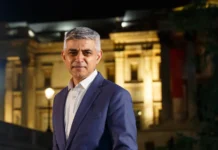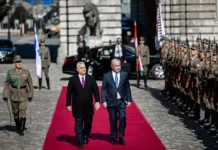What a marvelous time to be America’s enemy! Despots, dictators and other assorted villains are gloating.
I’ll give you two examples. Alluding to last week’s assault on the U.S. Capitol—a shameful episode that President Donald Trump recklessly and irresponsibly encouraged—Ali Khamenei, supreme leader of the Islamic Republic of Iran, tweeted: “Have you seen the situation in the U.S.? This is their democracy and this is their election fiasco. Today, the U.S. & ‘American values’ are ridiculed even by their friends.”
Then, referring to the mass uprisings against his oppressive regime 12 years ago, the theocrat added: “The US wanted to start a civil war in #Iran in 2009, & God has afflicted them with the same predicament in 2021.”
The Chinese Communist Party’s Xinhua News Agency equated the mob that breached the halls of Congress with pro-democracy protesters in Hong Kong, where freedoms are being crushed in flagrant violation of Beijing’s unambiguous treaty obligations. The spectacle in Washington, the Xinhua commentator added, “has left the world not only appalled but also disillusioned.”
Their consistent message to subjects at home and peoples abroad: “You’d be a fool to risk your life for a political system that is decadent, declining and bound to fail—or be defeated—sooner or later. Better to obey us. We know what’s best for you.”
Americans have been a particular target of such disinformation campaigns. Three years ago, I wrote about a bipartisan study that found that Russian President Vladimir Putin’s propagandists were “attempting to undermine faith in America’s democratic institutions, assist extremists on both the left and right, divide and polarize Americans (even more than they already are), and poison the policy debates that citizens of a mature republic should be able to conduct in a civil manner.”
The apparatchiks Putin tasked with this project have doubtless been rewarded with winter vacations at seaside resorts in Crimea—a territory Putin seized from neighboring Ukraine.
Complementary disinformation campaigns have been run by Beijing and Tehran. And following Pyongyang’s destructive hack of Sony Pictures in 2014, does anyone expect Hollywood ever again to make a movie depicting North Koreans as bad guys?
A significant development receiving almost no notice: America’s adversaries, different as they are in many ways, are uniting. I’ll give you three examples.
Last year, the People’s Republic of China and the Islamic Republic of Iran—neither, obviously, a genuine republic—approved a 25-year “strategic partnership” agreement. Note that Iran’s rulers are apparently untroubled by Beijing’s brutal treatment of its Muslim subjects.
Putin’s spokesmen, following the October expiration of the arms embargo mandated by the Joint Comprehensive Plan of Action, announced that Russia would be pleased to sell Tehran a long list of advanced weapons. American sanctions have forestalled that eventuality—for now.
Putin also spoke of a “strategic partnership” with China, adding that a formal military alliance was “quite possible to imagine.”
To deter this evolving axis, it would help to revitalize America’s alliances. President-elect Joe Biden has said that will be a priority, but easier said than done and, to illustrate why, I’ll give you three examples.
“We are concerned China will expand its aggressive stance in areas other than Hong Kong,” Yasuhide Nakayam, Japan’s State Minister of Defense, told Reuters last month. “I think one of the next targets, or what everyone is worried about, is Taiwan.” He added: “The United States is the leader of the democratic countries. I have a strong feeling to say: America, be strong!”
In the Middle East, America’s friends are concerned that Biden will ease economic pressure on Iran’s rulers, ignoring the fact those rulers continue to vow “Death to America!” and pose existential threats to both Israel and Arab nations.
Improving relations with America’s European allies is quite doable, given that they never got on with Trump. But beyond the atmospherics, the challenge will be persuading the continentals to stop accommodating the interests and ignoring the crimes of Tehran, Beijing and Moscow. To succeed, Biden will need to make clear that America is not in retreat, that America is not choosing to become weak, either economically or militarily.
As to the home front: In his victory speech last week, Biden pledged “to be a president who seeks not to divide, but to unify. Who doesn’t see red and blue states, but a United States. And who will work with all my heart to win the confidence of the whole people.”
That will require reaching out to the 74 million Trump supporters who are not extremists, who have never rioted or supported rioting in Washington or other American cities, but who have long been alienated by those who denigrate them as “deplorables,” “bitter clingers” and “racists.”
Biden need not endorse their values. He need not agree with their policy preferences. But he does need to take steps to restore their trust in the credibility of America’s elections going forward. And he should demonstrate that their rights and freedoms will not be diminished so long as he is in the White House.
“To make progress, we must stop treating our opponents as our enemy,” Biden said last week. “We are not enemies. We are Americans.”
Some of those close to the new president will support that mission and help him develop treatments to heal the nation. Others will advise him to bring the nation to heel. No choice he makes will be more consequential at home or abroad.
Clifford D. May is the founder and president of the Foundation for Defense of Democracies (FDD), and a columnist for “The Washington Times.”


























